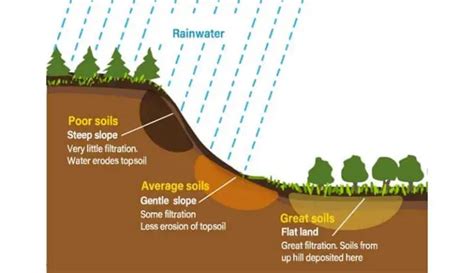Soil formation is a complex process that is influenced by a number of factors, including climate. The type of climate that is most beneficial to soil formation is one that is characterized by:

- Moderate temperatures
- Abundant rainfall
- A long growing season
In temperate climates, the soil is typically well-drained and has a good structure. This is because the moderate temperatures and abundant rainfall help to break down organic matter and create humus, which is a type of organic matter that is essential for soil fertility.
In tropical climates, the soil is often less well-drained and has a poorer structure. This is because the high temperatures and heavy rainfall can lead to the leaching of nutrients from the soil.
In cold climates, the soil is typically frozen for much of the year. This can make it difficult for plants to grow and for the soil to develop a good structure.
The Role of Climate in Soil Formation
Climate plays a significant role in the formation of soil. The following are some of the ways in which climate affects soil formation:
- **Temperature:** Temperature affects the rate of chemical and biological reactions in the soil. Higher temperatures increase the rate of these reactions, while lower temperatures slow them down.
- **Rainfall:** Rainfall provides the water that is necessary for the chemical and biological reactions that occur in the soil. It also helps to transport nutrients from the surface of the soil to the lower layers.
- **Growing season:** The length of the growing season affects the amount of time that plants have to grow and produce organic matter. Organic matter is an important component of soil, as it helps to improve soil structure and fertility.
The Benefits of Soil Formation
Soil formation is a beneficial process that provides a number of benefits, including:
- **Improved soil structure:** Soil formation helps to create a well-structured soil that is able to support plant growth. A well-structured soil is one that is porous and has a good drainage system.
- **Increased soil fertility:** Soil formation helps to increase soil fertility by adding organic matter to the soil. Organic matter is a source of nutrients for plants, and it also helps to improve soil structure.
- **Reduced soil erosion:** Soil formation helps to reduce soil erosion by creating a stable soil structure. A stable soil structure is less likely to be eroded by wind or water.
Conclusion
The type of climate that is most beneficial to soil formation is one that is characterized by moderate temperatures, abundant rainfall, and a long growing season. These conditions are ideal for the chemical and biological reactions that occur in the soil and for the production of organic matter. Soil formation is a beneficial process that provides a number of benefits, including improved soil structure, increased soil fertility, and reduced soil erosion.
Additional Information
The following are some additional resources that you may find helpful:
Tables
The following tables provide some additional information on the role of climate in soil formation:
| Climate Factor | Effect on Soil Formation |
|---|---|
| Temperature | Affects the rate of chemical and biological reactions in the soil |
| Rainfall | Provides the water that is necessary for the chemical and biological reactions that occur in the soil |
| Growing season | Affects the amount of time that plants have to grow and produce organic matter |
| Soil Type | Climate | Characteristics |
|---|---|---|
| Temperate | Moderate temperatures, abundant rainfall, long growing season | Well-drained, good structure |
| Tropical | High temperatures, heavy rainfall | Poorly drained, poor structure |
| Cold | Frozen for much of the year | Poorly drained, poor structure |
| Benefits of Soil Formation |
|—|—|
| Improved soil structure |
| Increased soil fertility |
| Reduced soil erosion |
| Tips for Improving Soil Formation |
|—|—|
| Maintain a healthy plant cover |
| Add organic matter to the soil |
| Reduce soil erosion |
| Test your soil regularly |
